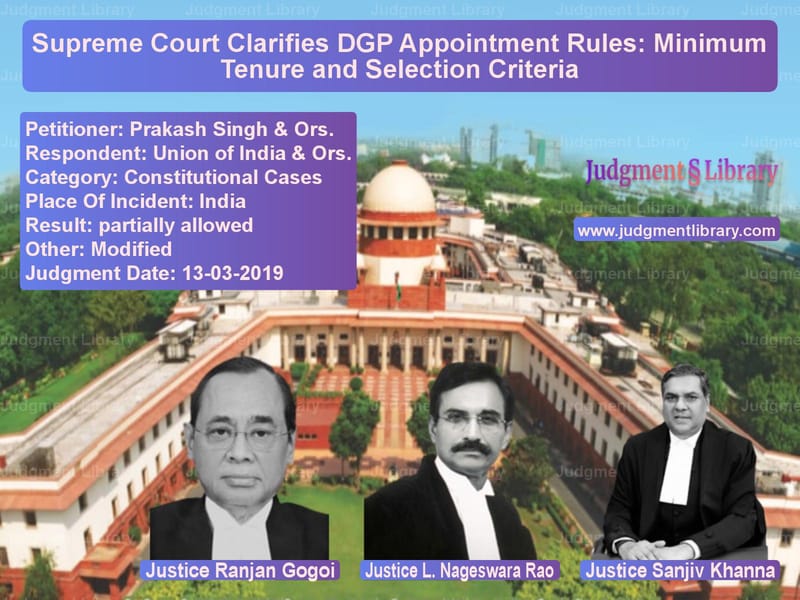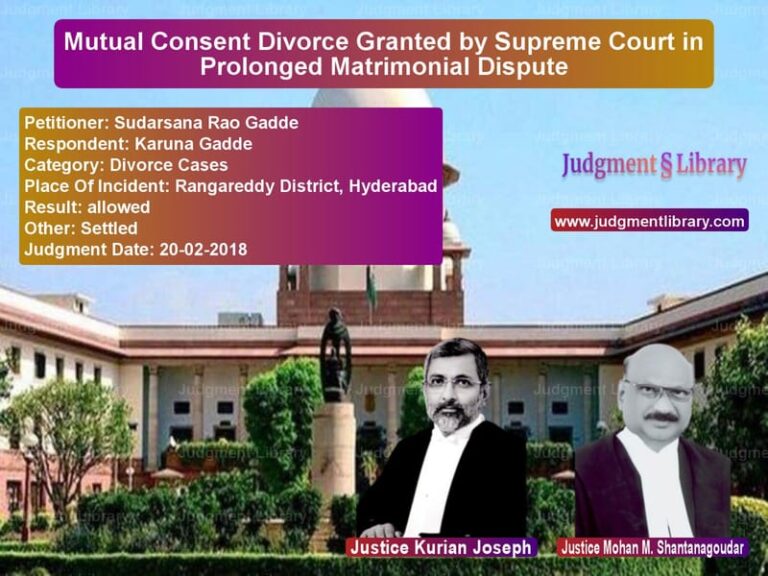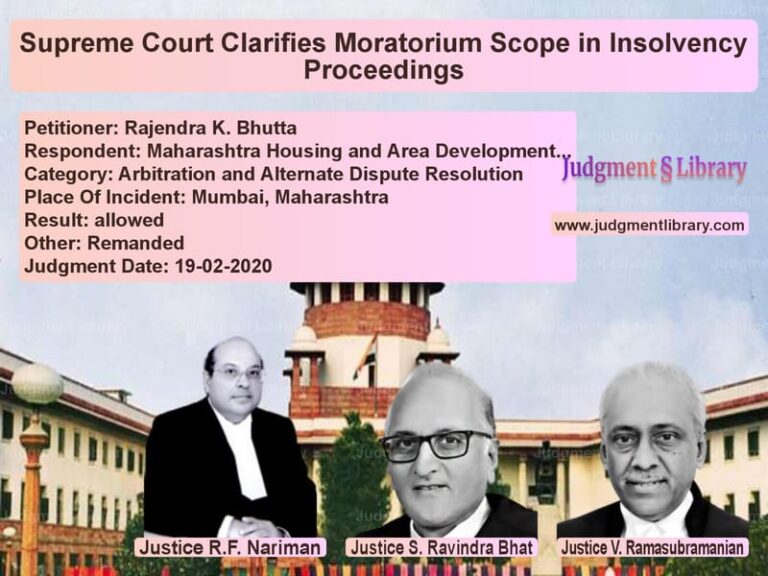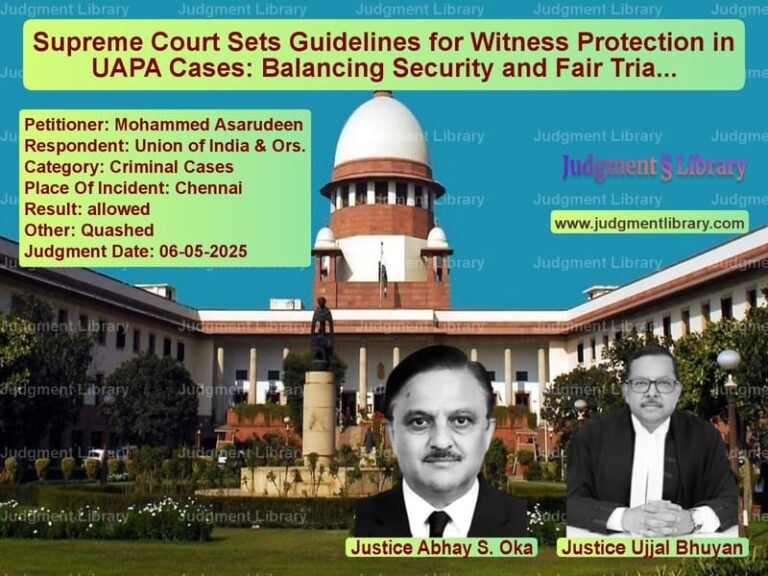Supreme Court Clarifies DGP Appointment Rules: Minimum Tenure and Selection Criteria
The Supreme Court of India, in the case of Prakash Singh & Ors. v. Union of India & Ors., issued a significant ruling on the appointment of the Director General of Police (DGP). The judgment, delivered by a bench comprising Ranjan Gogoi, L. Nageswara Rao, and Sanjiv Khanna, clarified the selection process, tenure, and eligibility criteria for appointing a DGP.
Background of the Case
The case originates from a series of directives issued by the Supreme Court in 2006 in Prakash Singh v. Union of India, aimed at bringing police reforms and ensuring the independence of law enforcement agencies. The Court had previously directed that:
- The DGP must be selected from the three senior-most officers empanelled by the Union Public Service Commission (UPSC).
- The selected officer must have a minimum tenure of two years.
- The DGP can only be removed for disciplinary reasons or criminal conviction.
However, various states enacted police laws that deviated from these directives, leading to a dispute over whether such modifications were valid.
Issues Before the Court
The primary issues in the present case revolved around:
- Whether state governments could appoint DGPs on an acting basis.
- Whether UPSC should only consider officers with at least two years of residual service before retirement.
- Whether state police acts conflicting with the Court’s previous directions were valid.
Petitioners’ Arguments
The petitioners contended that:
- States were circumventing the Supreme Court’s directives by appointing DGPs on the verge of retirement, ensuring they got an automatic two-year extension.
- UPSC’s practice of empaneling only officers with two years of service left was too restrictive and excluded otherwise competent officers.
- The legislative changes made by various states negated the spirit of the Court’s ruling in Prakash Singh.
Respondents’ Arguments
The state governments and UPSC defended their procedures by arguing:
- State governments needed flexibility in choosing the best officers for the DGP position.
- The two-year tenure requirement should be interpreted flexibly, allowing states to appoint officers nearing retirement.
- State laws governing police appointments should not be subject to judicial scrutiny.
Supreme Court’s Observations
The Supreme Court, after analyzing the arguments, made key observations regarding the appointment of DGPs.
1. No Appointment of Acting DGPs
The Court reiterated that states cannot appoint DGPs on an acting basis and must follow the UPSC empanelment process.
2. Minimum Residual Tenure of Six Months
The Court ruled that an officer must have at least six months of service left before retirement to be considered for DGP appointment. It stated:
“Neither this Court had contemplated recommendation for appointment of officers who are on the verge of retirement nor the practice now adopted by the UPSC in making the empanelment, i.e., empanelling officers who have at least two years of tenure.”
3. Selection Must Be Based on Merit
The judgment emphasized that merit, not just seniority, must be the primary criterion for selecting a DGP:
“The appointment of a Director General of Police in a State should be purely on the basis of merit and to insulate the said office from all kinds of influences and pressures.”
4. State Laws Cannot Override Supreme Court Directives
The Court held that any state law contradicting its directives will remain in abeyance until further examination.
Final Judgment
The Supreme Court modified its previous directive and clarified:
- DGP appointments must be made from the UPSC-prepared panel.
- Officers must have at least six months of residual service before retirement.
- The selection must be based on merit, not just seniority.
- State laws contradicting these directives will remain suspended until reviewed.
Key Takeaways
- No Acting DGPs: The ruling strictly prohibits the appointment of DGPs in an acting capacity.
- Minimum Service Requirement: Officers must have at least six months of service left before retirement to be considered.
- Merit-Based Selection: The judgment reinforces that only the most competent officers should be chosen, irrespective of seniority.
- Judicial Oversight: The ruling keeps state legislation in check, ensuring police reforms are implemented as intended.
Conclusion
The Supreme Court’s ruling in Prakash Singh & Ors. v. Union of India & Ors. reaffirms its commitment to police reforms. By clarifying the appointment process and minimum tenure criteria, the judgment ensures transparency and accountability in law enforcement leadership. The decision prevents states from bypassing the Court’s previous rulings and upholds the independence of the police force from political influences.
Petitioner Name: Prakash Singh & Ors..Respondent Name: Union of India & Ors..Judgment By: Justice Ranjan Gogoi, Justice L. Nageswara Rao, Justice Sanjiv Khanna.Place Of Incident: India.Judgment Date: 13-03-2019.
Don’t miss out on the full details! Download the complete judgment in PDF format below and gain valuable insights instantly!
Download Judgment: Prakash Singh & Ors. vs Union of India & Ors Supreme Court of India Judgment Dated 13-03-2019.pdf
Direct Downlaod Judgment: Direct downlaod this Judgment
See all petitions in Fundamental Rights
See all petitions in Public Interest Litigation
See all petitions in Legislative Powers
See all petitions in Judgment by Ranjan Gogoi
See all petitions in Judgment by L. Nageswara Rao
See all petitions in Judgment by Sanjiv Khanna
See all petitions in partially allowed
See all petitions in Modified
See all petitions in supreme court of India judgments March 2019
See all petitions in 2019 judgments
See all posts in Constitutional Cases Category
See all allowed petitions in Constitutional Cases Category
See all Dismissed petitions in Constitutional Cases Category
See all partially allowed petitions in Constitutional Cases Category







